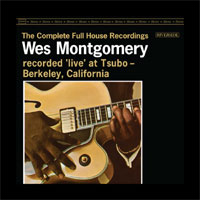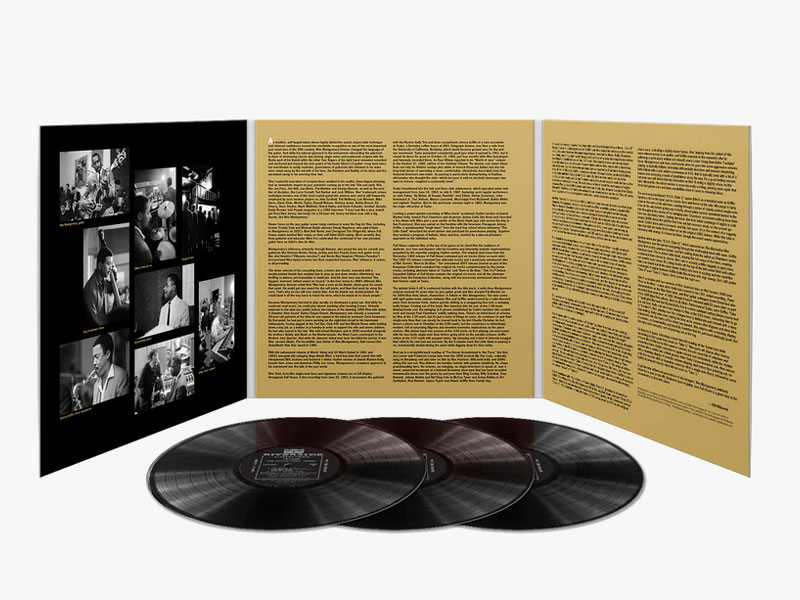Wes Montgomery • The Complete Full House Recordings Riverside/Craft Recordings CR00681
Montgomery had a brilliant career, becoming one of jazz’s greatest guitar players after teaching himself the instrument by listening to Charlie Christian recordings and copying Christian’s trademark use of octaves. He started performing publicly at the age of 23, and his group, the Mastersounds, scored a recording contract with Pacific Jazz a decade later. Two years after that, Montgomery signed with Riverside and released the first of 22 albums as a leader. During his career, Montgomery recorded three albums considered masterpieces: 1960's The Incredible Jazz Guitar of Wes Montgomery and Full House, both released by Riverside; Smokin’ At The Half Note was released on Verve in 1965. He died of a heart attack in 1968 at 45 years of age. As with many artists, recordings of live performances frequently trump the quality and intensity of their studio albums, and Montgomery was certainly wired for an exceptional performance on June 25, 1962. The band and its leader were on fire that night, and even the alternate and unreleased takes are exceptional. The rhythm section plays as if it had been recording with Montgomery for years, and tenor saxophonist Johnny Griffin displays just the right level of heat. Side one of the LP, which is made up of the leader's eponymous title track, the Lerner/Loewe standard “I’ve Grown Accustomed To Her Face” and Dizzy Gillespie’s “Blue ‘n’ Boogie,” is among the best sides of guitar jazz, bar none. Even before the addition of the two additional LPs for this set, Full House was Montgomery’s greatest live performance. Although Smokin’ At The Half Note is billed as a live recording, only one side is from the referenced live session; side two was filled out with takes taped at Van Gelder Studios. With this new reissue, we get six sides from the same live performance. The recording is a fascinating look at just how different a rhythm section can sound, as the Wynton Kelly Trio also appears a year earlier with Miles Davis on his In Person Friday and Saturday Nights at the Blackhawk, recorded in April of 1961 (best heard on the Impex reissue [Columbia/Impex IMP 6009]). While the two sessions were close in time and recorded in nearby nightclubs, the rhythm section adapts to the cool sound of Miles Davis in 1961 and the hot combo of Montgomery and Griffin in 1962 without missing a beat.
The other thing that puts this set apart is the sound. The recording site doesn't look special from the one photo on the back album cover. It's a room where you might host a church tea or high-school dance. However, the session was recorded by one of the great engineers, Wally Heider. He was perhaps the very best remote recording engineer of his time, and he overcame the venue’s sonic shortcomings. Heider honed his skills working with Bill Putnam at Los Angeles’s famed United Recording. He eventually found his way to San Francisco, where he opened his studio in 1969, recording some of the great music coming out of the Bay Area over the next decade. Much of his greatest work, however, was done from his recording truck, and this album is evidence of his early success with remote recording. More than most early stereo recordings, the Full House session presents a soundstage without large gaps between left, right and center. Add to that the accurate tonal reproduction and good balance with audience noise and it stands with the best live jazz recordings. Full House was released in 2002 as part of Analogue Productions’ 45rpm series, mastered and cut by Kevin Gray and Steve Hoffman [Riverside/Analogue Productions 9434]. This time out, only Kevin Gray cut the lacquers, but the mastering was done by Joe Tarantino, who has mastered more jazz reissues from the Fantasy Records vaults than anyone. The 45rpm version sounds a bit warmer than this new release, and some may prefer that sound. The new Craft version sounds more right to my ears and may be closer to what is on the tapes. The placement of the instruments is different on the two reissues, with Montgomery better centered on some cuts with the 45rpm release. Both reflect a mirror image of the stage shown in the cover photo, with piano to the left and drums to the right, opposite of what the photograph shows of the stage. My original pressing of this album is in mono, so I cannot say how the original stereo pressing lays out the band in the soundstage. Ignore the photograph, however, and revel in the great sound of this recording. The three LPs are contained in a three-part foldout
sleeve. This kind of sleeve does not age well if opened and closed repeatedly, but the
first LP slips out without folding and unfolding the cover, and that is likely the disc to
see repeated play. The photography in the packaging is excellent, far better than the
third- or fourth-generation images found in the Analogue Productions version, and even
better than the original. In short, this is an essential jazz recording that looks and
sounds better than ever. |

 oncord Music, through its Craft Recordings imprint,
has released a three-LP set of one of Wes Montgomery’s greatest recordings, one disc
replicating the original Riverside release and two others adding the rest of the available
takes. Much of this music has been previously released on CD, but this set adds a couple
of new alternative tracks. A live concert recorded on June 25, 1962 in Berkeley,
California, Full House was captured at Tsubo, which must be one of the
shortest-lived of all jazz clubs. It opened in 1961 and closed in October of 1962. It
reopened the following year as a folk coffeehouse named Jabberwock, which closed in 1967.
The jazz scene in the San Francisco Bay Area was thriving in the 1960s, with famous venues
like The Jazz Workshop, Keystone Korner, and The Black Hawk, all now consigned to history,
but none closed with such dispatch as Tsubo.
oncord Music, through its Craft Recordings imprint,
has released a three-LP set of one of Wes Montgomery’s greatest recordings, one disc
replicating the original Riverside release and two others adding the rest of the available
takes. Much of this music has been previously released on CD, but this set adds a couple
of new alternative tracks. A live concert recorded on June 25, 1962 in Berkeley,
California, Full House was captured at Tsubo, which must be one of the
shortest-lived of all jazz clubs. It opened in 1961 and closed in October of 1962. It
reopened the following year as a folk coffeehouse named Jabberwock, which closed in 1967.
The jazz scene in the San Francisco Bay Area was thriving in the 1960s, with famous venues
like The Jazz Workshop, Keystone Korner, and The Black Hawk, all now consigned to history,
but none closed with such dispatch as Tsubo.